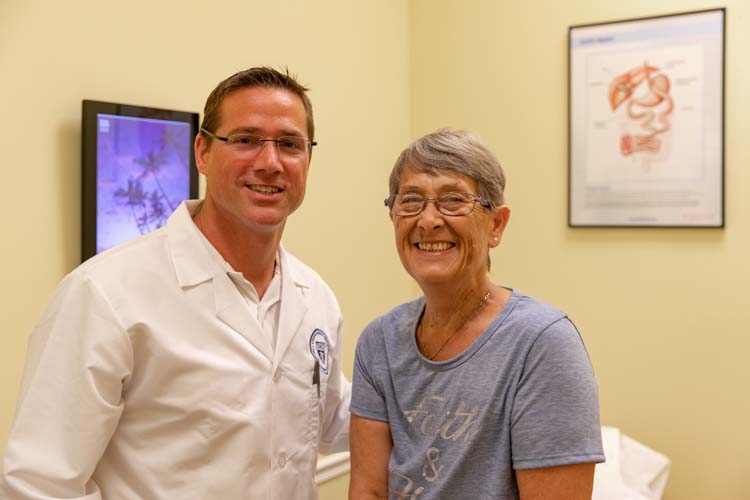
Vero Lake Estates resident Sharlynn Hewitt knows a lot about breast cancer. She ought to. She’s been dealing with the disease since 2015.
And she’s far from alone.
According to Breast Cancer Statistics, a biannual publication for cancer clinicians, breast cancer is the second-most common cancer diagnosed among U.S. women, with some 252,710 new cases reported just last year.
It’s also the second leading cause of cancer death among women in this country.
Upwards of 40,000 women will die from breast cancer this year.
Hewitt, however, has no intention of adding to that total. She’s a fighter – and she has friends. Friends that include medical all-stars Dr. Starleen Schaffer, an internal medicine specialist, fellowship-trained surgeon Dr. Jason Radecke, and longtime Vero Beach oncologist Dr. Noor Merchant.
What Hewitt calls her “cancer journey” started “when Dr. Schaffer recommended both Dr. Merchant and Dr. Radecke and they all got together and set up a plan for me.”
And if there’s such a thing as love at first sight in cancer care, Hewitt says she found it then.
“The first time I met Dr. Radecke, I was with my husband, my daughter, my wound nurse and one of my best friends so I had really good people around me. But Dr. Radecke, I just fell in love him. When I came in here, I just knew that he had God on his side. And I believe in faith over fear.
“It was hard to make that decision to cut my breasts off,” says Hewitt, who ended up having a radical mastectomy, “but I’d rather be alive.”
The engaging Radecke doesn’t claim a divine connection but he does have experience that belies his youthful appearance. He performs “hundreds and hundreds” of surgeries each year and proudly adds, “I work with people like [Vero Beach’s] Dr. Raul Storey and [Melbourne’s] Dr. Rahul Chopra because they are the best.”
Radecke also has a very personal connection with his breast cancer patients. He carries the “BRCA” gene in his DNA – a gene makes him 12 times more likely to develop breast cancer than other men and roughly as likely as any woman.
In fact, Radecke’s twin brother has just undergone a bilateral mastectomy. So has an uncle and a cousin.
In other words, empathy for anyone facing this disease comes naturally to this father of three. He knows what his breast cancer patients face.
Despite the dangers of the disease, he’s also full of optimism, pointing out that breast cancer death rates dropped nearly 40 percent between 1989 and 2015.
“What’s happening is that our diagnostic modalities like mammograms, 3D mammograms, ultrasounds and MRIs are all getting better, and we have more women coming for screening tests.
“Two generations ago,” Radecke continues, “we just didn’t talk about these things. You got a big lump in your breast so you just didn’t talk about it, and it would grow huge, start getting red and pus-out and you didn’t talk about it until you were finally sick and then you told your doctor. By that time it was too late. Now we have a record number of women getting their mammograms at 40 or even earlier.”
And the earlier breast cancer is detected, the less radical the surgical solutions can be – although there is no “one-size-fits-all” breast cancer treatment regimen.
For example, different people react differently to chemotherapy drugs and radiation treatments.
Hewitt, who moved to the Treasure Coast over 40 years ago, says she “took six different chemo drugs. My immune system has been wonderful. They say I’m awesome as far as my immune system.”
Others, however, aren’t so lucky. Or determined. Or strong.
Hewitt opted for a double mastectomy because, as she puts it, “I didn’t want [cancer] to come back. I didn’t want to go through it again.” But there are other, less radical surgical options available including “lumpectomies.”
Radecke says “I did a lumpectomy yesterday. We call it a quadrantectomy. In essence I took the entire upper inner quadrant of this woman’s breast, but cosmetically, it’s going to do really well because it will fill up with fluid and look just like the other side.”
The key to any breast cancer plan is having the best possible team and Radecke says that’s something the Treasure Coast is blessed with.
“I tell you this area is just amazing,” says Radecke. “The Treasure Coast attracts some really high-quality physicians. I believe that our radiologists, our medical oncologists and our radiation oncologists are all very well trained.”
Dr. Jason Radecke is with the Riverside Surgical & Weight Loss Center and the Steward Medical Group at Sebastian River Medical Center where he is the assistant chief of surgery. His offices are at 14430 U.S. 1 in Sebastian. The phone number is 772-581-8003.



